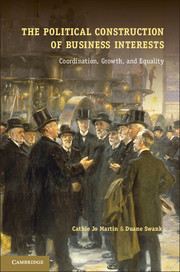Book contents
- Frontmatter
- Contents
- Figures
- Tables
- Acknowledgments
- Introduction
- 1 Collective Political Engagement and the Welfare State
- 2 The Political Origins of Coordinated Capitalism
- 3 Party Conflict and the Origins of Danish Labor Market Coordination
- 4 British Experiments in National Employers’ Organization
- 5 Sectional Parties and Divided Business in the United States
- 6 The Origins of Sector Coordination in Germany
- 7 Twenty-First Century Breakdown? Challenges to Coordination in the Postindustrial Age
- 8 Institutional Sources of Employers’ Preferences for Social Policy
- 9 Employers, Coordination, and Active Labor Market Policy in Postindustrial Denmark
- 10 Employers and Active Labor Market Policy in Postindustrial Britain
- 11 The Failure of Coordination and the Rise of Dualism in Germany
- 12 The Political Foundations of Redistribution and Equality
- Conclusion Social Solidarity after the Crisis of Finance Capitalism
- Bibliography
- Index
Introduction
Published online by Cambridge University Press: 05 June 2012
- Frontmatter
- Contents
- Figures
- Tables
- Acknowledgments
- Introduction
- 1 Collective Political Engagement and the Welfare State
- 2 The Political Origins of Coordinated Capitalism
- 3 Party Conflict and the Origins of Danish Labor Market Coordination
- 4 British Experiments in National Employers’ Organization
- 5 Sectional Parties and Divided Business in the United States
- 6 The Origins of Sector Coordination in Germany
- 7 Twenty-First Century Breakdown? Challenges to Coordination in the Postindustrial Age
- 8 Institutional Sources of Employers’ Preferences for Social Policy
- 9 Employers, Coordination, and Active Labor Market Policy in Postindustrial Denmark
- 10 Employers and Active Labor Market Policy in Postindustrial Britain
- 11 The Failure of Coordination and the Rise of Dualism in Germany
- 12 The Political Foundations of Redistribution and Equality
- Conclusion Social Solidarity after the Crisis of Finance Capitalism
- Bibliography
- Index
Summary
On one of the darkest days of the year, an author made her way by multiple trains to a small, wind-swept village in northern Jutland and continued on foot to a factory on the outskirts of town. Battered by relentless wind and sleet (albeit fortified by a piece of Danish pastry en route), she felt like a science fiction protagonist when she suddenly stepped into a utopian vision of the twenty-first century. The factory floor was a hotbed of experimental methods and collaborative spirit, what with its use of the raging winds for power, state-of-the-art technology, and teams of managers and workers striving for continuous productivity improvements. Perhaps most surprising to the uninitiated, however, was the firm’s means for obtaining a skilled workforce, the linchpin of the system. Many employees came from the ranks of the long-term unemployed, who had been trained by the government’s active labor market program – Denmark’s version of welfare reform. Through an elaborate job rotation scheme, the firms’ own workers went to school for retraining and the trained unemployed (subsidized by the state) took their places on the shop floor to gain practical experience. Eventually, the unemployed were moved into regular jobs and the cycle began once again.
This happy story of cooperation raises obvious questions: What factors go into the development of dynamic cooperative and relatively egalitarian societies and, in particular, how do governments convince employers that social investments will better their bottom line? High levels of business cooperation were essential to the success of the active labor market programs that sustained the hiring strategy in our wind-swept Danish village. Firms viewed the programs as “win-win” arrangements, that expanded employment, greatly reduced the welfare rolls, allowed companies to fill unproductive positions (with subsidized workers), and maintained labor stability and wage equality (as low-wage positions were subsidized by the state). Yet, whereas the benefits of the programs might seem compelling in hindsight, the great puzzle is how employers came to believe in this win-win logic.
- Type
- Chapter
- Information
- The Political Construction of Business InterestsCoordination, Growth, and Equality, pp. 1 - 5Publisher: Cambridge University PressPrint publication year: 2012

